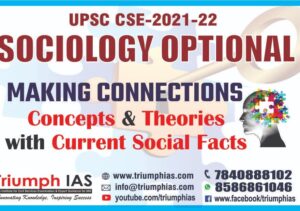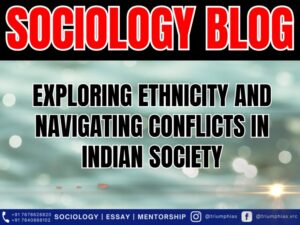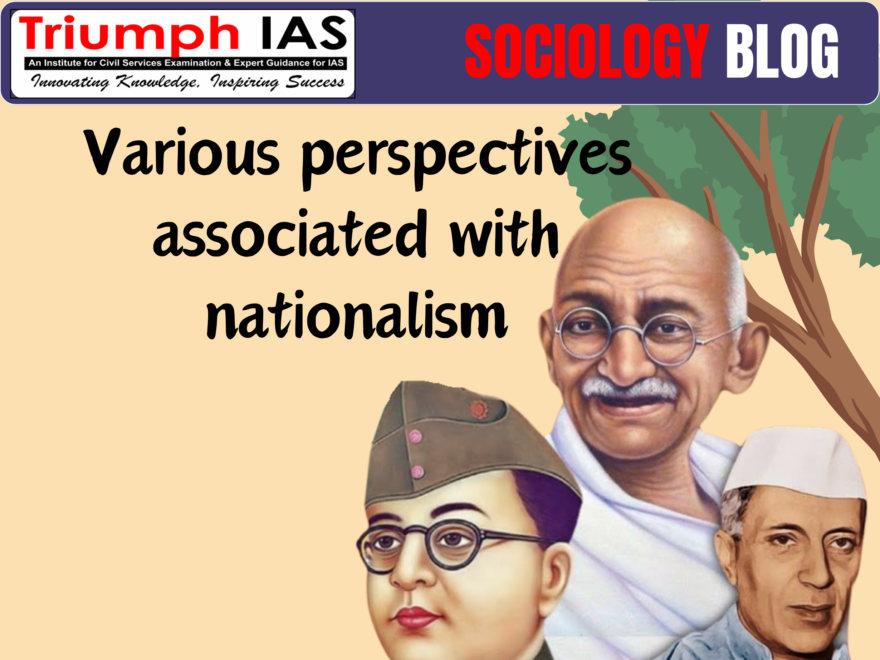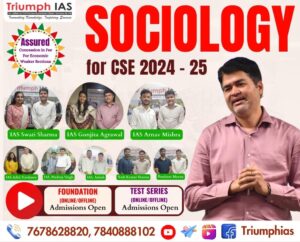Various perspectives associated with nationalism
Relevant for Sociology Optional for Civil Service Examination.
Sociology Paper -2
Unit 3 : Social Change in India : Politics and Society
Various perspectives associated with nationalism
Colonialist Perspective
The colonialist perspective on Indian Nationalism spans over a century, with key figures such as James Mill, Mountstuart Elphinstone, Henry Elliot, John Dowson, W.W. Hunter, and Vincent Smith offering comprehensive interpretations of Indian history.
- Rejection of Nationhood: Colonialist thinkers, starting with James Mill, rejected the concept of India as a unified nation. They underscored India’s diversity and disunity as a rationale for colonial rule, portraying it as the force that brought cohesion to a supposedly fragmented land.
- Diverse and Hostile Units: Prominent colonialist historians like W.W. Hunter and Herbert Risley sought to substantiate India’s lack of unity by categorizing it into numerous tribes and castes. The portrayal of India as a land of hostile and warring units was a common theme.
- Impossibility of Nationhood: British historians like John Strachey and John Seeley argued that India lacked the essential characteristics of a nation. They viewed India as a conglomerate of religious, ethnic, linguistic, and regional groups that could never be molded into a cohesive nation.
- Undermining the Nationalist Movement: As the nationalist movement gained traction, colonial ideologues dismissed it as a self-serving venture led by a few middle-class individuals, particularly targeting Bengali Babus. Valentine Chirol, in “Indian Unrest” (1910), contended that India was merely a ‘geographical expression’ fabricated by the British for administrative convenience.
- India as a Geographic Creation: According to Chirol, India was a ‘variegated jumble of races and peoples,’ lacking the cohesion necessary for nationhood. Vincent Smith echoed this sentiment, asserting that only British rule prevented ancient divisions from erupting into strife.
- Imposed Unity Through British Rule: The colonialist view held that a central authority, imposed from outside, was crucial to correcting India’s inherent lack of unity. The benevolent despotism of British rule, according to Vincent Smith, prevented India from fragmenting further.
- Denial of National Character: Even as the nationalist movement evolved into a pan-Indian mass movement after World War I, colonialist historians questioned its efficacy. They emphasized religious, caste, and linguistic divisions to negate its national character.
Conclusive Evaluation
The colonialist view on Indian nation and nationalism disregarded the possibility of India ever becoming a nation. It, moreover, considered the national movement as a movement of narrow self-interest led by a microscopic English-educated minority. According to this view, this small middle-class section of the population would never be able to form a nation out of the disparate assemblage of innumerable castes, linguistic and regional groups.
Nationalist views on Indian nationalism
- Nationalist perspectives on Indian nationalism and the national movement were shaped in response to colonialist views, with a strong rejection of colonial denigration of India and its people.
- In contrast to the instrumentalist approach of many colonialist historians, the nationalist historians adopted an idea-centric approach. There are primarily two views among them: according to some, the nationalist ideas have been adopted under the influence of the West, while some others argue that they have been present since the ancient times.
- Two main viewpoints emerged among nationalist historians: one suggesting that nationalist ideas were influenced by the West, and the other asserting that these ideas had deep roots in India’s ancient past.
- During the early phase of the national movement, Moderate nationalists believed that the yearning for freedom was primarily a result of Western influences, with Western education and ideas of liberty playing a crucial role. According to Bisheshwar Prasad, the Indian National Congress emerged as an avenue for self-expression and self-assertion, driven by the people’s intense feelings of loss of freedom under British rule.
- In contrast, the Extremist phase of the national movement was explained by some writers as a consequence of better ideas, greater spirit of freedom, and more dedicated leaders. Liberal nationalist writers tended to view the national movement as the spread and realization of the idea or spirit of nationalism.
- Many nationalist historians did not consider India as a formed nation in modern times, Surendranath Banerjea, regarded India as ‘a nation-in-the-making’.
- C. Majumdar argued that the Congress movements gave reality to the ideal of Indian unity. On the contrary, some, like Radha K. Mookerji, asserted that India had been a unified nation since ancient times, with a sense of geographical and national unity.
- Bipan Chandra argues, the ‘liberal nationalist writers tend on the whole to base themselves on the Whig view of history and see the national movement as a result of the spread and realization of the idea or spirit of nationalism’
- Various leaders, such as Tagore, Gandhi, Subhas Chandra Bose, and Jawaharlal Nehru, presented diverse views on India’s national identity. Tagore emphasized India’s inclusive and assimilative spirit, differentiating it from European nationalism. Along similar lines, Gandhi also visualized the India of the past and imagined an India of the future.
- Tara Chand also thought that creation of an Indian nation was a recent phenomenon which emerged due to ‘the combined economic and political change’
- Nationalist historians highlighted factors such as the colonial rulers’ unfriendly attitude, the Ilbert Bill controversy, modern education, the partition of Bengal, and economic issues as catalysts for the national movement. They underscored the exploitation of peasants, high land revenue, and economic factors leading to disaffection among Indians.
- These historians pointed out the underlying contradiction between imperialist rule and Indian society, emphasizing a pan-Indian anti-imperialist front. They downplayed class, caste, linguistic, regional, and religious contradictions to portray the national movement as a collective struggle of all classes in Indian society.
- Nationalist historians believed that the middle class played a crucial role in mobilizing the masses against imperialism. They argued that the educated middle class led movements for political progress and independence, representing the social aspirations of the middle classes and the desire for freedom and racial justice.
- In their view, nationalist leaders were seen as dedicated idealists, selflessly working for the welfare of the nation. Despite coming from the middle class, these leaders were perceived as having no personal or group interests and acted as the selfless spokespersons of the silent majority.
Conclusive Evaluation
The nationalist historians strongly reacted against this negative characterisation of Indian people. They completely rejected the colonialist idea that India could never be formed into a nation. In fact, as many of them argued, India always possessed the potential to be forged into a nation, and it did happen at several points in the past. Although they did not deny the role of modern Western ideas, many of these historians argued that India had an underlying cultural unity since the most ancient times. The nationalist historians also regarded the national movement as a pan-Indian movement encompassing all classes and groups led by idealist and selfless leaders
Reference: Static Portion
Related Blogs…
 |
 |
Frequently Asked Questions:
1. Question: Define the term “ethnic movement” and provide an example from India.
Answer: An ethnic movement refers to a collective effort by a group sharing common cultural, linguistic, or religious traits, seeking to assert their identity and rights; an example from India is the Khalistan Movement in Punjab.
2. Question: Identify the main objectives behind the Gorkhaland ethnic movement.
Answer: The Gorkhaland ethnic movement primarily seeks to establish a separate state for India’s Nepali-speaking population in the Darjeeling region, advocating for linguistic and cultural recognition and political autonomy.
3. Question: What was the Operation Blue Star, and which ethnic movement was it related to?
Answer: Operation Blue Star was a military action in 1984, aiming to remove Sikh militants hiding in the Golden Temple in Amritsar; it is related to the Khalistan movement, which sought a separate Sikh country.
4. Question: Mention a critical factor that triggered the emergence of ethnic movements in India, as discussed by Dipankar Gupta.
Answer: Dipankar Gupta emphasized that ethnicity is fundamentally a political process, wherein caste and religion, the key components of identity formation, are politicized by leaders for vested interests.
5. Question: What were the primary reasons for the Assam Ethnicity conflicts involving Bodo tribals and Bengali Muslim settlers?
Answer: The Assam Ethnicity conflicts primarily stemmed from issues related to immigration, land rights, and resource allocation, leading to clashes, riots, and evolving relationships among indigenous communities to address challenges.
6. Question: Briefly describe the role of the Dravidian Movement in terms of caste and societal structure.
Answer: The Dravidian Movement, led notably by E.V. Ramasamy, aimed to establish an egalitarian society, focusing on anti-Brahmanism and advocating for equal rights for backward castes, while also introducing reforms like self-respect marriages.
7. Question: Name the prominent ethnic movements in North-East India and specify one common objective.
Answer: Prominent ethnic movements in North-East India include the Nagas’ and Mizos’ struggles; a common objective was to gain autonomy and recognition for their distinct tribal identities and cultural uniqueness.
8. Question: What is the key argument of Gail Omveldt regarding traditional Indian society and multiculturalism?
Answer: Gail Omveldt opposed romanticizing traditional Indian society, arguing that hierarchy has always dominated it and dismissing the notion that multiculturalism is an intrinsic feature of Indian society as a myth.
9. Question: Briefly explain the social hierarchy factor as a contributing element to ethnic movements as suggested by Olzak.
Answer: Olzak suggests that the construction of hierarchies among ethnic communities, which often leads to the suppression of one group by another, is a key factor that can instigate social and ethnic movements.
10. Question: Identify one consequence of the unequal economic development factor within the context of ethnic movements in India.
Answer: One consequence of unequal economic development is the marginalization and underdevelopment of certain groups, leading to feelings of alienation and sometimes initiating ethnic movements as these groups strive for equality and recognition.
GS Related Practices Questions…
To master these intricacies and fare well in the Sociology Optional Syllabus, aspiring sociologists might benefit from guidance by the Best Sociology Optional Teacher and participation in the Best Sociology Optional Coaching. These avenues provide comprehensive assistance, ensuring a solid understanding of sociology’s diverse methodologies and techniques.
META TAGS:
Ethnic Movements, ethnic movements in india, ethnic movement in sociology, Punjab Movement, North-East Ethnic Movements, Gorkhaland Movement, Dravidian Movement, Assam Ethnicity, Ethnic Conflicts, Sociopolitical Impact, India, Ethnic Consciousness, Ethnic Rights, Political Crisis, Economic Development, Cultural Disparities, Khalistan Movement, Nagaland, Mizoram, Multiculturalism, Political Economy, Identity Formation, Social Hierarchies, Bodo Tribals, Bengali Muslim Settlers, Anti-Sikh Riots, Operation Blue Star, Unequal Development, Ethnic Violence, Political Mobilization

Why Vikash Ranjan’s Classes for Sociology?
Proper guidance and assistance are required to learn the skill of interlinking current happenings with the conventional topics. VIKASH RANJAN SIR at TRIUMPH IAS guides students according to the Recent Trends of UPSC, making him the Best Sociology Teacher for Sociology Optional UPSC.
At Triumph IAS, the Best Sociology Optional Coaching platform, we not only provide the best study material and applied classes for Sociology for IAS but also conduct regular assignments and class tests to assess candidates’ writing skills and understanding of the subject.
Choose The Best Sociology Optional Teacher for IAS Preparation?
At the beginning of the journey for Civil Services Examination preparation, many students face a pivotal decision – selecting their optional subject. Questions such as “which optional subject is the best?” and “which optional subject is the most scoring?” frequently come to mind. Choosing the right optional subject, like choosing the best sociology optional teacher, is a subjective yet vital step that requires a thoughtful decision based on facts. A misstep in this crucial decision can indeed prove disastrous.
Ever since the exam pattern was revamped in 2013, the UPSC has eliminated the need for a second optional subject. Now, candidates have to choose only one optional subject for the UPSC Mains, which has two papers of 250 marks each. One of the compelling choices for many has been the sociology optional. However, it’s strongly advised to decide on your optional subject for mains well ahead of time to get sufficient time to complete the syllabus. After all, most students score similarly in General Studies Papers; it’s the score in the optional subject & essay that contributes significantly to the final selection.
“A sound strategy does not rely solely on the popular
Opinion of toppers or famous YouTubers cum teachers.”
It requires understanding one’s ability, interest, and the relevance of the subject, not just for the exam but also for life in general. Hence, when selecting the best sociology teacher, one must consider the usefulness of sociology optional coaching in General Studies, Essay, and Personality Test.
The choice of the optional subject should be based on objective criteria, such as the nature, scope, and size of the syllabus, uniformity and stability in the question pattern, relevance of the syllabic content in daily life in society, and the availability of study material and guidance. For example, choosing the best sociology optional coaching can ensure access to top-quality study materials and experienced teachers. Always remember, the approach of the UPSC optional subject differs from your academic studies of subjects. Therefore, before settling for sociology optional, you need to analyze the syllabus, previous years’ pattern, subject requirements (be it ideal, visionary, numerical, conceptual theoretical), and your comfort level with the subject.
This decision marks a critical point in your UPSC – CSE journey, potentially determining your success in a career in IAS/Civil Services. Therefore, it’s crucial to choose wisely, whether it’s the optional subject or the best sociology optional teacher. Always base your decision on accurate facts, and never let your emotional biases guide your choices. After all, the search for the best sociology optional coaching is about finding the perfect fit for your unique academic needs and aspirations.
To master these intricacies and fare well in the Sociology Optional Syllabus, aspiring sociologists might benefit from guidance by the Best Sociology Optional Teacher and participation in the Best Sociology Optional Coaching. These avenues provide comprehensive assistance, ensuring a solid understanding of sociology’s diverse methodologies and techniques. Sociology, Social theory, Best Sociology Optional Teacher, Best Sociology Optional Coaching, Sociology Optional Syllabus.
Best Sociology Optional Teacher, Sociology Syllabus, Sociology Optional, Sociology Optional Coaching, Best Sociology Optional Coaching, Best Sociology Teacher, Sociology Course, Sociology Teacher, Sociology Foundation, Sociology Foundation Course, Sociology Optional UPSC, Sociology for IAS,
Follow us :
🔎 https://www.instagram.com/triumphias
🔎https://www.youtube.com/c/TriumphIAS
🔎https://t.me/VikashRanjanSociology
Find More Blogs…
| Compare and contrast Karl Marx’s and Max weber’s | Karl Marx- Historical Materialism |
| Talcott Parsons : Social system | Scope of the subject and comparison with other social sciences |
KEYWORD: Nationalism, Nationalism, Nationalism, Nationalism, Nationalism, Nationalism, Nationalism, Nationalism, Nationalism, Nationalism, Nationalism, Nationalism, Nationalism, Nationalism, Nationalism, Nationalism, Nationalism, Nationalism, Nationalism, Nationalism, Nationalism, Nationalism, Nationalism, Nationalism, Nationalism


